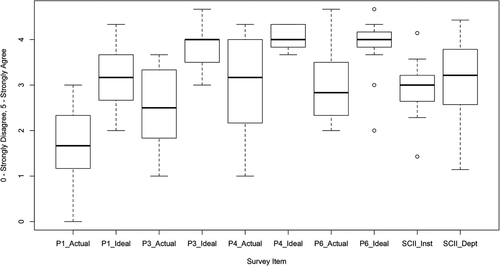Developed by Courtney Ngai, Mary E. Pilgrim, Daniel L. Reinholz, Joel C. Corbo, and Gina M. Quan
| Purpose | To characterize departmental culture related to undergraduate education in three areas: instructional climate, social network, and core principles. |
|---|---|
| Format | Multiple-choice, Agree/disagree, Short answer |
| Duration | 15 min |
| Focus | Department Climate (Instructional practices, department leadership, faculty networks, instructor conversations, student perceptions, students as partners, collaboration, continuous improvement, equity and inclusion) |
| Level | Upper-level, Intermediate, Intro college |
more details
This is the second highest level of research validation, corresponding to at least 5 of the validation categories below.
Research Validation Summary
Based on Research Into:
- Student thinking
Studied Using:
- Student interviews
- Expert review
- Appropriate statistical analysis
Research Conducted:
- At multiple institutions
- By multiple research groups
- Peer-reviewed publication
The DELTA survey is extensively research validated. One part of the DELTA survey (the Instructional Climate block) is based on 2 factors from the Survey of Climate for Instructional Improvement (SCII): Collegiality and Leadership, plus 2 items from Organizational Support (S6 and S9 on the SCII). The SCII was research validated through repeated administration, exploratory factor analysis, and iteration of the instrument. The other elements of the DELTA survey were developed through review of the literature on departmental culture and high functioning teams, and iterated after getting feedback from faculty, graduate students, and experts in organizational change. They also pilot-tested the survey, conducted cognitive interviews, broadly administered the survey to 124 participants, and conducted psychometric analysis on the results. The DELTA survey is organized into 6 principles based on research into factors that support strong departments. The developers conducted factor analysis to see if these 6 principles resolved into factors. The factor analysis did not validate this organization empirically, but instead found 4 factors. The survey still uses the 6 principles because this is a useful organizational structure for understanding departments.
References
- C. Ngai, M. Pilgrim, D. Reinholz, J. Corbo, and G. Quan, Developing the DELTA: Capturing Cultural Changes in Undergraduate Departments, CBE Life. Sci. Educ. 19 (2), ar15 (2020).
We don't have any translations of this assessment yet.
If you know of a translation that we don't have yet, or if you would like to translate this assessment, please contact us!
| Typical Results |
|---|
The figure below, from Ngai et al. 2020, shows DELTA scores from one department, to illustrate what scores might look like.
|
The latest version of the DELTA survey, released in 2020, is version 1.




